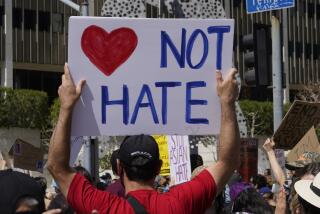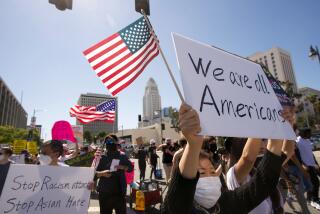Asian-Americans Urged to Report Hate Crimes : Human relations: Stop accepting abuse and report it to prosecutors, crime experts tell Anaheim seminar. And beware of ‘quick fixes’ on racism, one speaker warns.
- Share via
ANAHEIM — Reacting to increasing reports of anti-Asian hate crimes in Orange County, law enforcement and legal experts Saturday urged Asian-Americans to stop accepting the abuse and report it for prosecution under hate crime laws.
“Until now, many Japanese have stayed quiet,” said Lisa M. Kitsuta, moderator of the hate crimes seminar organized by local Japanese-American leaders. “It is time that we try to protect ourselves.”
“If you keep it to yourself and you don’t tell anyone, then you think it just happens to you,” Kathy Imahara of the Asian Pacific Legal Center told the crowd of about 100 in a ballroom of the Pan Pacific Hotel.
“I’ll bet everyone in this room was a victim of a racial incident some time in their lives,” Imahara said. “If everyone stood up, we’d have 100 cases to pursue.”
The County Human Relations Commission has received reports of 14 anti-Asian assaults over the past two years, vice president Frances Williams said. Koreans were most often attacked, Japanese the least.
Of more than 600 hate crimes reported in Los Angeles County last year, 54 involved Asian-Americans, said Michael Yamaki of the Los Angeles Police Commission.
Although just five of the victims were of Japanese descent, other victims apparently were thought to be Japanese by their attackers, he said.
“The damage done by hate crimes cannot be measured solely by injuries or dollars and cents,” Orange Police Chief John R. Robertson said. “These incidents can damage the very fabric of our society.”
Yamaki decried Americans’ “impatient” pursuit of “quick fixes” to complicated problems, such as the economy and racism. He encouraged the audience to seek the real roots of strife in society and work toward long-term solutions.
“Historically in this country, if you didn’t like who you lived next to, you moved west,” he joked. “The problem is that we have nowhere else to go. There’s only the ocean.
“We haven’t developed the skills to accept that we have differences. We haven’t learned how to live with people, that’s our fundamental problem,” he said.
Several speakers mentioned a June 15 Huntington Beach beating, in which three men allegedly beat two Japanese-American teen-age brothers with a metal bar.
“The boys had done nothing to provoke the attack but simply look Asian,” said Kitsuta, one of many representatives of the Japanese-American Lawyers Assn. attending the conference.
Because hate crimes are often unprovoked, speakers said, Asian-Americans can do little to prevent the attacks.
“No matter what we do, it won’t really protect us, because the hatred comes from the way we look,” Imahara said. “Until we can change that, nothing’s going to happen.”
Suthin Siwasathien, 47, of Torrence, a Chinese immigrant from Thailand, was beaten in an apartment complex laundry room in March.
“It could happen anywhere, anyplace,” he said.
Siwasathien said he was folding his laundry when a teen-ager approached him, asked whether he was Japanese, then punched him in the nose, bashed his head against a concrete step several times and ran away.
Although individuals remain vulnerable, speakers said, the Asian-American community can work to eradicate the racial tension that leads to hate crimes.
“When people talk to each other and realize we’re not really so different, a lot of the hatred goes away,” Imahara said.
More to Read
Sign up for Essential California
The most important California stories and recommendations in your inbox every morning.
You may occasionally receive promotional content from the Los Angeles Times.










